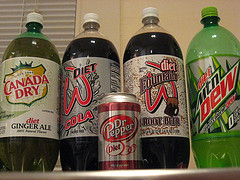This week, read about how diet soda affects gut microbes, staying fast as we age, why we love repetition in music, losing weight without willpower, and more.
Diet Soda May Alter Gut Microbes and Increase Risk of Diabetes
 The microbiome is a fascinating and popular research area. New studies are leading to an emerging understanding of how our diet affects gut microbes, and how this can lead to changes in our bodies and influence our health.
The microbiome is a fascinating and popular research area. New studies are leading to an emerging understanding of how our diet affects gut microbes, and how this can lead to changes in our bodies and influence our health.
A new analysis in mice suggest that non-caloric artificial sweeteners (saccharin, sucralose, and aspartame) alter the microbes in our gut in a way that might increase risk for diabetes and promote obesity. Mice fed artificial sweeteners for 11 weeks had a much higher blood sugar level compared to a control group; also, when researchers transplanted their gut bacteria into normal mice, these mice developed glucose intolerance.
The researchers also looked at the influence of artificial sweeteners in humans: 7 people drank beverages with large amounts of artificial sweeteners for a week, and 4 developed glucose intolerance. Further, they found marked differences in the microbiome of artificial sweetener users compared to those who didn’t. (NPR/Nature, September 2014)
This is preliminary research that is helping contribute to our knowledge of the microbome-diet interactions, but larger and more studies needed to draw relevant conclusions for human consumption of artificial sweeteners. Note that the doses of artificial sweetener were quite high, and the most rigorous aspect of the study conducted in mice. Nonetheless, if you’re looking for the most healthful way to quench your thirst, water is usually the best option.
Interested in learning more about the microbiome and health? This free Coursera course looks excellent.
How Repetition Enchants the Brain and the Psychology of Why We Love It in Music
Here is a terrific video based on the research of cognitive scientist Elizabeth Hellmuth Margulis, director of the Music Cognition Lab at the University of Arkansas via Maria Popova’s excellent Brain Pickings Blog.
More links of interest this week:
- Who says aging up has to slow you down? New research shows that our bodies are capable of some impressive accomplishments as we get older. Although this is a cycling-specific article, many of the tips apply to other sports. Some good input from exercise physiologist Inigo San Millan (Bicycling Magazine). Want to read more about staying fast and fit as you age? Check out my Masters Athlete’s page.
- When the Problem is Priorities, Don’t Blame Cooking. An excellent response to recent research questioning the “burden” of cooking, (KJ Dell’antonia, New York Times)
- Food expert suggests changes to lose weight — willpower not required. Brian Wansink is a researcher who is passionate about figuring out how cues that aren’t related to hunger influence our eating habits. His new book “Slim by Design: Mindless Eating Solutions for Everyday Life” shows you how to rearrange your environment so it’s conducive to good habits and healthy eating. I haven’t read the book yet, but love Wansink’s Mindless Eating. I’ve written more about Brian Wansink’s research here.
- Exercise boosts tumor-fighting ability of chemotherapy. Combining exercise with chemotherapy shrunk tumors more than chemotherapy alone (mouse study). (Science Daily/American Journal of Physiology September 2014).
- Good tips on improving iron absorption by Fooducate. Also check my information on iron the iron needs of athletes.
- Study Finds Comfort Food a Myth – passage of time, not food, helps mood.
- Preventing Cancer Through Good Food and Exercise. A new report by the American Association for Cancer Research shows that three of the top preventable risk factors for cancer have to do with what we eat and how often we move. (The Atlantic, American Association for Cancer Research).
- The Top 50 Science Stars of Twitter. Scientists are increasingly using social media to amplify their public health outreach. This is a worthwhile list that includes the scientist’s “Kardashian index.” One problem with this list is the lack of women (only 4!) – so be sure to check Paige Brown Jarreau‘s list here. (Science Magazine, Scilogs).
- Safer Streets with a Dancing Traffic Light (video). This dancing traffic light makes people wait and watch rather than walk through the red light (I wish more bystanders would dance along!). (via Yoni Freedhoff).
See More Issues of This Week in Food, Health, and Fitness
___________
Diet Soda Photo by globochem3x1minus1 